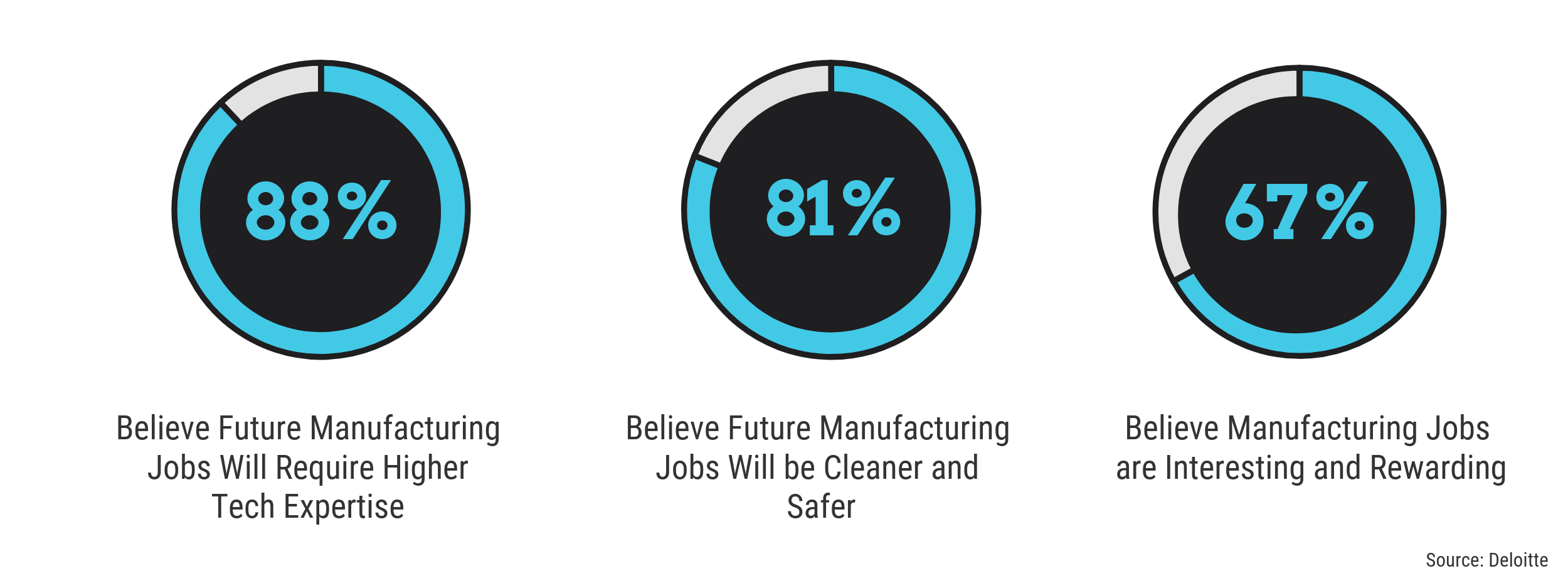
By 2025, the manufacturing sector will face a talent gap of nearly 2 million unfilled jobs. Baby Boomer retirements, industry growth, and technological innovations that require new skill sets have converged to create a talent shortage that could prove to be a critical weak point in an industry that is otherwise flourishing. Millennials offer a huge pool of crucial talent for companies that increasingly need their technical knowledge and skills.
The problem, however, is that young workers show little interest in manufacturing careers. Among millennials and college students, manufacturing has a tainted reputation as an industry with boring, blue-collar jobs, minimal pay, and few opportunities. Why work in a factory when you can jump on board at a trendy tech startup – or even pursue a lucrative career at a tech giant like Google or Amazon?
The bad news is that manufacturing has an image problem. The good news is that the tides may be shifting. Deloitte research indicates that 88% of Americans believe future manufacturing jobs will require higher tech expertise (a drawing card for tech-savvy millennials), 81% believe these jobs will be cleaner and safer, and 67% believe they are interesting and rewarding. Those familiar with manufacturing are almost twice as likely to speak positively to children about a future career in the industry.

Perceptions may slowly be changing, but manufacturing recruiters will need to be creative in their hiring approach if they want to persuade tech-savvy young workers to consider a career in manufacturing. They question is: how should you adapt your recruiting strategy to attract the next generation of workers?
1. Educate.
Spread the word about the opportunities for competitive compensation, career advancement, and professional development in the manufacturing industry. Make education a part of your recruitment strategy, and showcase the wide variety of skills and job options on your blog, social media, and job postings. For example, the manufacturing industry needs developers, technicians, analysts, engineers, executives, and supply chain managers in addition to talent with traditional manufacturing skills. Help young workers see the variety of skills needed and get them excited about growth and development in the industry.
2. Use Strategic Partnerships.
Create apprenticeships and paid internship programs designed to introduce young workers to the manufacturing industry. These programs bring fresh minds and skills into your organization, and they also allow you to begin grooming a new generation of employees to work productively within your culture.
3. Connect With Schools.
Programs like Project Lead the Way bring businesses and educators together to begin preparing elementary and high school students for future success in science, technology, and math fields, including manufacturing. Partnerships with community colleges and trade schools also open doors for companies to interact with students by serving as guest lecturers, panelists, or program sponsors. In both of these scenarios, companies can improve student perceptions of the industry by investing in them as they develop their skills and giving them first-hand experience with the variety of jobs available.
4. Showcase Technology Advancements.
Millennials are digital natives, and they gravitate toward companies that use technology in innovative ways. That’s good news for the manufacturing industry, where tech innovations are already transforming business processes and hold significant potential for future advancements. The tech skills young workers bring to the table can help you stay on the front edge of the innovation curve, and implementing technology solutions will also attract talented millennials who are looking for a challenging, fulfilling career path.
5. Use Social Media Strategically.
Don’t assume that merely being on social media in some capacity will be enough to reach millennials. In fact, Facebook and Twitter have increasingly become the domain of older generations, while younger generations tend to be found in larger numbers on Snapchat (78%) and Instagram (71%). Developing social media personas can help you determine how best to get your message out to millennials on various social media channels.Millennials also prefer video messages to text, and video job ads can help boost both candidate engagement and your SEO ranking. Almost 90% of millennials who work in marketing at small and medium-sized businesses use or want to use video for digital advertising. As “video natives,” these millennials are more likely to respond positively to video recruiting efforts. In fact, one analysis found that candidates spend almost triple the amount of time on a video job ad as they do on a text job posting.
6. Design a Desirable Workplace Culture.
Much has been said about millennials and their preference for flexible, meaningful work and collaborative relationships with managers and coworkers. And it’s all true. While millennials do want jobs that offer competitive pay, they also value work that matters and they gravitate toward managers who invest in their success. Work-life balance and effective performance management strategies are essential to developing a strong company culture that will engage millennial workers and support retention. That starts with designing a company culture where employees can use their strengths and where they have a positive relationship with managers and coworkers.
7. Invest In Your Employees.
Millennials also want to work for companies that offer opportunities for growth and advancement. Recognition programs, professional development, on-the-job training, mentorships, and opportunities to earn licenses or certifications can be attractive incentives for young workers. Companies also benefit by training internal employees who can then be tapped for promotions or different skill sets, which saves on recruiting and onboarding costs.
Millennials are looking for high-paying, interesting jobs where they can use their strengths to build a satisfying career. All of those goals are possible in the manufacturing industry. The key is to showcase the innovation and growth potential offered by a manufacturing career as young workers choose jobs that will shape the future of work.

